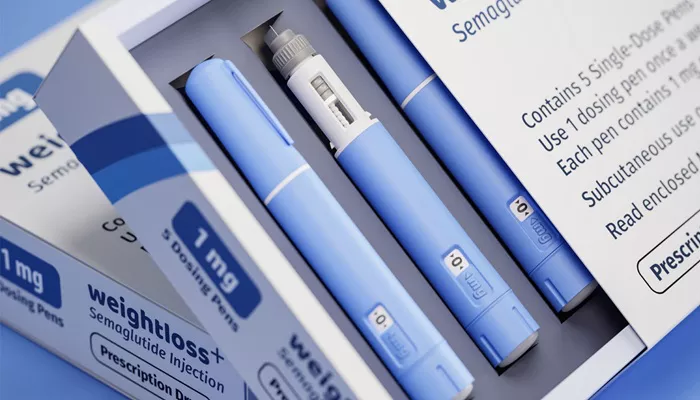In the first head-to-head clinical trial of two popular obesity drugs, Eli Lilly’s Zepbound demonstrated a nearly 50% greater weight loss compared to Novo Nordisk’s Wegovy.
Participants in the study who took Zepbound (tirzepatide) lost an average of 50 pounds (22.8 kilograms) over the course of 72 weeks. In contrast, those using Wegovy (semaglutide) lost approximately 33 pounds (15 kilograms). The results were published Sunday in the New England Journal of Medicine and were part of a trial funded by Eli Lilly.
Both Zepbound and Wegovy are part of a new class of medications that help control appetite and promote feelings of fullness by mimicking hormones in the gut and brain. However, Zepbound targets two hormones, GLP-1 and GIP, while Wegovy targets only GLP-1, explained Dr. Louis Aronne, the director of the Comprehensive Weight Control Center at Weill Cornell Medicine.
“Targeting two hormones may lead to better weight loss,” said Aronne, who led the study and presented the findings at the European Congress on Obesity in Spain. Despite Zepbound’s stronger performance in this trial, Aronne emphasized that both drugs are valuable tools in treating obesity, which affects nearly 40% of American adults.
“The goal of these medications is to improve health,” he added. “Most people won’t require the most effective drug.”
The trial included 751 U.S. participants who were overweight or had obesity and at least one related health condition, excluding diabetes. Participants received weekly injections of either Zepbound (10 mg or 15 mg) or Wegovy (1.7 mg or 2.4 mg).
By the trial’s end, those taking Zepbound had lost about 20% of their body weight on average, while those taking Wegovy lost nearly 14%. The Zepbound group also reduced their waist size by about 7 inches (17.8 cm), compared to about 5 inches (12.7 cm) in the Wegovy group. Furthermore, 32% of Zepbound users lost at least a quarter of their body weight, while only 16% of Wegovy users reached that milestone.
Both groups saw health improvements, including reductions in blood pressure, blood fat, and blood sugar levels, as they lost weight. However, side effects were common. More than 75% of participants reported mild to moderate gastrointestinal issues such as nausea, constipation, and diarrhea. About 6% of Zepbound users dropped out due to adverse effects, compared to 8% of those on Wegovy.
These GLP-1 medications have gained popularity in the U.S., with one in eight adults reporting their use, according to a 2024 survey by KFF, a health policy research organization. Zepbound generated $4.9 billion in global sales last year, while Wegovy earned nearly $8.8 billion (58.2 billion Danish kroner).
Despite their success, affordability remains a barrier for many. Both drugs were recently removed from the U.S. Food and Drug Administration’s shortage list, and manufacturers have introduced programs that reduce costs to around $500 per month, depending on the dose. However, access can still be limited. CVS Health announced this week that, starting July 1, Wegovy will be the preferred option on its formulary, excluding Zepbound.
Dr. Angela Fitch, chief medical officer of Knownwell, an obesity care company, stressed the importance of having multiple treatment options for obesity. She noted that Wegovy has been shown to reduce the risk of serious heart problems by 20%. “We need all these medications because so many patients require treatment,” she said.

